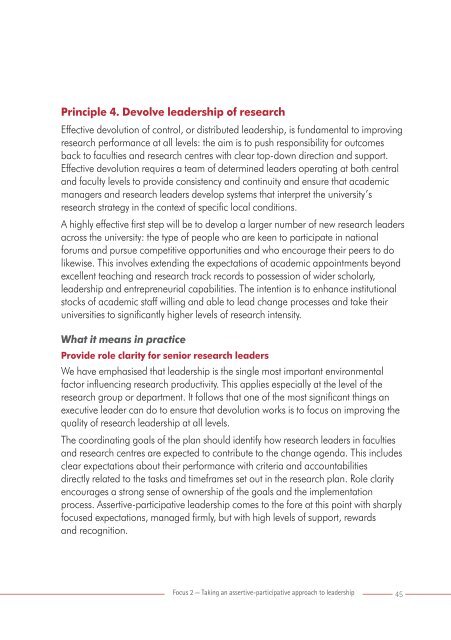handbook-executive-leadership-of-research-development-pdf-v10
handbook-executive-leadership-of-research-development-pdf-v10
handbook-executive-leadership-of-research-development-pdf-v10
Create successful ePaper yourself
Turn your PDF publications into a flip-book with our unique Google optimized e-Paper software.
Principle 4. Devolve <strong>leadership</strong> <strong>of</strong> <strong>research</strong>Effective devolution <strong>of</strong> control, or distributed <strong>leadership</strong>, is fundamental to improving<strong>research</strong> performance at all levels: the aim is to push responsibility for outcomesback to faculties and <strong>research</strong> centres with clear top-down direction and support.Effective devolution requires a team <strong>of</strong> determined leaders operating at both centraland faculty levels to provide consistency and continuity and ensure that academicmanagers and <strong>research</strong> leaders develop systems that interpret the university’s<strong>research</strong> strategy in the context <strong>of</strong> specific local conditions.A highly effective first step will be to develop a larger number <strong>of</strong> new <strong>research</strong> leadersacross the university: the type <strong>of</strong> people who are keen to participate in nationalforums and pursue competitive opportunities and who encourage their peers to dolikewise. This involves extending the expectations <strong>of</strong> academic appointments beyondexcellent teaching and <strong>research</strong> track records to possession <strong>of</strong> wider scholarly,<strong>leadership</strong> and entrepreneurial capabilities. The intention is to enhance institutionalstocks <strong>of</strong> academic staff willing and able to lead change processes and take theiruniversities to significantly higher levels <strong>of</strong> <strong>research</strong> intensity.What it means in practiceProvide role clarity for senior <strong>research</strong> leadersWe have emphasised that <strong>leadership</strong> is the single most important environmentalfactor influencing <strong>research</strong> productivity. This applies especially at the level <strong>of</strong> the<strong>research</strong> group or department. It follows that one <strong>of</strong> the most significant things an<strong>executive</strong> leader can do to ensure that devolution works is to focus on improving thequality <strong>of</strong> <strong>research</strong> <strong>leadership</strong> at all levels.The coordinating goals <strong>of</strong> the plan should identify how <strong>research</strong> leaders in facultiesand <strong>research</strong> centres are expected to contribute to the change agenda. This includesclear expectations about their performance with criteria and accountabilitiesdirectly related to the tasks and timeframes set out in the <strong>research</strong> plan. Role clarityencourages a strong sense <strong>of</strong> ownership <strong>of</strong> the goals and the implementationprocess. Assertive-participative <strong>leadership</strong> comes to the fore at this point with sharplyfocused expectations, managed firmly, but with high levels <strong>of</strong> support, rewardsand recognition.Focus 2 — Taking an assertive-participative approach to <strong>leadership</strong>45



